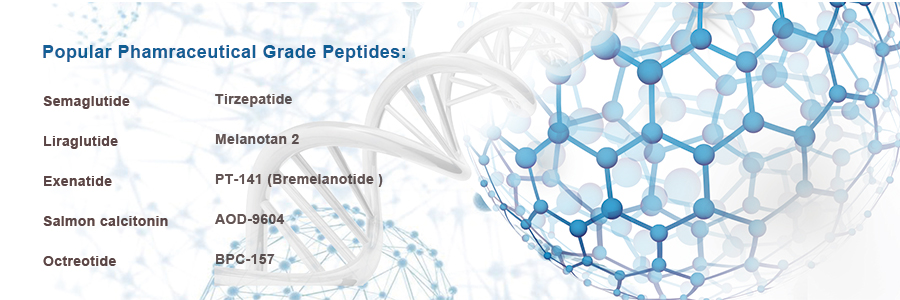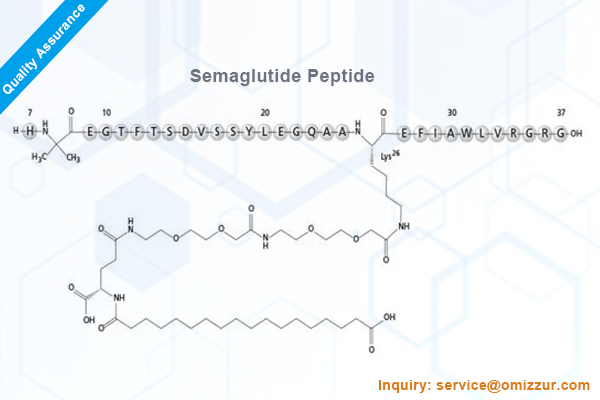Pharma Grade Peptides
Omizzur is a biological company engaged in custom peptide synthesis. Omizzur summarizes all knowledge about pharma grade peptides, with an article of approximately 1000 words and a reading time of 3 minutes. You can save our website or share with friends.

Keywords: Pharma grade peptides, Custom peptide synthesis, Peptide synthesis company
What are Peptides?
Amino acids are the fundamental units that make up proteins, while peptides are a type of amino acid that is converted into a compound through peptide bonds through separation techniques, forming peptide drugs.
Pharma grade peptides are often formed by dehydration of 10-100 amino acid molecules and separation and purification. Over 100 amino acids can form proteins, and the main difference between peptides and proteins is the length of peptide chains.
At the same time, peptides are more stable because there are no factors in peptide synthesis that affect protein stability. Peptides are bioactive substances that affect various cellular functions in organisms and are indispensable in life activities. They involve various fields such as cell growth, hormones, and nerves, and have specific therapeutic effects in clinical practice.
List of Pharam Grade Peptides from Omizzur :
Name | CAS | Size |
Exenatide | 79517-01-4 | 5/10/50/100mg |
Semaglutide | 910463-68-2 | 5/10/50/100mg |
Salmon calcitonin | 47931-85-1 | 5/10/50/100mg |
Liraglutide | 204656-20-2 | 5/10/50/100mg |
Tirzepatide | 2023788-19-2 | 5/10/50/100mg |
Melanotan | 121062-08-6 | 5/10mg |
PT-141 | 189691-06-3 | 5/10mg |
Octreotide | 79517-01-4 | 5/10/50/100mg |
BPC-157 | 137525-51-0 | 5/10mg |
(For pharma grade peptide inquiry please: [email protected])
What are the Advantages of Pharma Grade Peptides?
Pharma grade peptides are easily synthesized, modified, and optimized, and their inherent characteristics make them highly valuable for medicinal purposes. Peptide drugs generally have a short half-life, unstable structure and properties, but compared to macromolecular protein or antibody drugs, peptide drugs are more stable and have higher unit activity at room temperature.
The size, polarity, hydrophilicity, and charge of peptide molecules are not as good as traditional small molecules, making it difficult for peptide drugs to cross physiological barriers. Currently, many pharmaceutical companies have conducted research on the feasibility of oral administration of peptides and have achieved significant results.
What are the Applications of Pharma-Grade Peptides?
Pharma grade peptides are widely present in signaling molecules, transmission molecules, and digestive molecules in biological systems; Peptides that integrate multiple functions are widely used in cardiovascular, blood, muscle, bone and other systems, thus occupying an important position in the medical industry. Although the development history of pharma level peptidess are relatively short, their rapid development has become a focus of pharmaceutical research.
Research and Clinical Application Status of Pharma Grade Peptides
At present, most pharma grade peptides have the characteristics of direct oral ineffectiveness, short biological half-life, and long treatment cycle. Therefore, their development and application are currently hot topics, and their development prospects are unlimited. At present, pharmaceutical grade peptides have been widely used in clinical practice.
Due to its high safety and outstanding efficacy, it has been recognized by more and more doctors and patients, and its position in clinical treatment is constantly improving. Many varieties have also been included in the treatment guidelines and expert consensus for related diseases in the United States, becoming an important support force for clinical diagnosis and treatment.

The main characteristics of peptide drugs are high molecular weight, poor lipid solubility, and difficulty in passing through biological physiological barriers. To achieve the best medication effect, injection is necessary. But frequent injections are very painful, and in order to alleviate patients' pain and medication pain, people have conducted research on non injectable forms of pharma grade peptides.
Research on relevant literature has found that the most studied area currently is medication in the nasal cavity and lungs.
1. Nasal administration
The mucosal area of the nasal cavity is about 200 cm2, with large epithelial cell gaps and close connections to capillaries. Lymphatic tissue is abundant, and the blood flow rate is about 40 mL/min. The medication conditions are good.
By inhaling through the nasal cavity, drugs can directly enter the entire blood system, reducing the possibility of being degraded by large proteins and denatured by aerosol particles, promoting drug absorption, and achieving good therapeutic effects. At present, there are mainly two kinds of medication: spray and nasal drip, and the bioavailability of nasal drip is higher.
2. Pulmonary administration
The adsorption surface area of the human lungs is 140m2, much larger than the nasal cavity, and the lungs have abundant capillaries and large epithelial cell gaps, resulting in stronger permeability during the medication process. Some animal experiments have also shown that the bioavailability of peptide drugs during pulmonary administration is about 20% to 50%.
However, some pharam grade peptides may also be degraded by lung proteins or denatured by binding with aerosol particles during the process of reaching lung tissue. Further analysis is needed as to which peptide drugs are suitable for lung administration.
In the process of pulmonary administration, the appropriate administration method is crucial and will have a direct impact on the drug release effect in the lungs. The use of specific inhalation devices to directly reach the lungs is currently the main medication method for powdered drugs, which can achieve the best therapeutic effect.
The ideal powdered drug needs to meet the following conditions: it can also rapidly depolymerize in large quantities at low flow rates and pressures, directly reaching the lungs. The administration method of pulmonary powder drugs is still in the research stage.
Oral administration of Pharma Grade Peptides
Oral administration is not too painful and convenient, and is popular in clinical practice. However, peptide drugs are not easily absorbed by the gastrointestinal tract, so oral administration has serious limitations.
The process of inhibiting disease development and alleviating patient pain requires taking a large amount of drugs, while peptide drugs are prone to degradation by a large number of peptidases and proteolytic enzymes due to their unstable chemical structure and properties, making it difficult to achieve oral administration of peptide drugs. At the same time, some drugs will be eliminated by the liver even after absorption.
Currently, research has mostly focused on improving the ability of peptide drugs to penetrate physiological barriers and resist protein degradation. In promoting the passage of peptide drugs through physiological barriers, the main method is to use enhancers.
Common enhancers include fatty acids, bile salts, chelating agents, etc., while methods to overcome obstacles in peptide oral absorption of enzymes include the use of microemulsions and enzyme inhibitors.
Customer Service Center
 Quote Request for Pharma Grade Peptides :
Quote Request for Pharma Grade Peptides :
* Please mail us your product name, sequences / structural formula, CAS (if any), Omizzur customer services will get in touch with you within 1 hour.
Read Related Articles:
Copyright © 2020 Omizzur Inc | Terms & Conditions | Privacy Notice | Sitemap